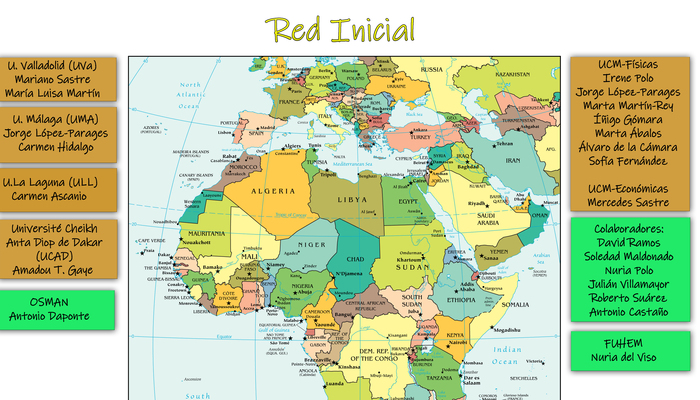
Inter-University Climate Migration and Refugee Network (MASCARAS)
MASCARAS is a cooperation project awarded in the XVII Call for grants for cooperation projects that contribute to the achievement of the UCM 2021 Sustainable Development Goals. Vice-rectorate for International Relations and Cooperation
Person responsible for the project: Irene Polo Sánchez
Department: Physics of the Earth and Astrophysics
Project partners: Université Cheikh Anta Diop de Dakar (UCAD)
Summary:
Current anthropogenic Climate Change (CC) is a civilisational problem of our time. Climate science has shown unequivocally that human activities, particularly those of industrialised countries, have been the main driver of CC since the mid-20th century. The impacts of CC are very diverse, including changes in sea level, increased pollution in cities, decreases in the diversity of marine and terrestrial ecosystems, and increases in extreme weather events (IPCC 2013).
Other impacts involve changes in people's livelihoods. For example, tropical and subtropical regions such as the Sahel region are experiencing simultaneous increases in temperature and decreases in rainfall, aggravating the crop production situation and displacing people to large cities. Globally, an estimated 6% of the world's population migrates for climate-related reasons. When these people cross borders they become refugees. As a Mediterranean country, Spain is also being affected by the CC and a pending task is to involve the whole of civil society. To do so, we believe that we need a holistic approach to understand the implications of CC, which is enriched by different areas of knowledge, collectives and sensitivities.
The MASCARAS project aims to establish an inter-university and inter-disciplinary network, which in turn generates synergies with social entities, for discussion and reflection on climate change and its social impacts and, specifically, on climate migrations and climate refugees. In the short term, collaborations will be established for academic research and a conference will be organised for reflection and exchange of points of view where both academic groups (Universities) and civil society (NGOs, Associations, etc.) will have a voice. The network aims to be sustainable and its horizon objective will be to understand how to transform reality.
In the initial network we have different nodes (UCM, UCAD, University of Malaga, University of La Laguna, University of Valladolid, FUHEM and OSMAN). Throughout the year we will integrate more people to work in the network and participate in the conferences. The MASCARAS project is working on the following SDGs: 13. - 17. Partnerships to achieve goals. - Quality education -10. Reducing inequalities within and between countries.
The direct beneficiaries of the project will be society as a whole, since one of the objectives is to transfer knowledge and new reflections on CC and its impacts on society and specifically on migration.